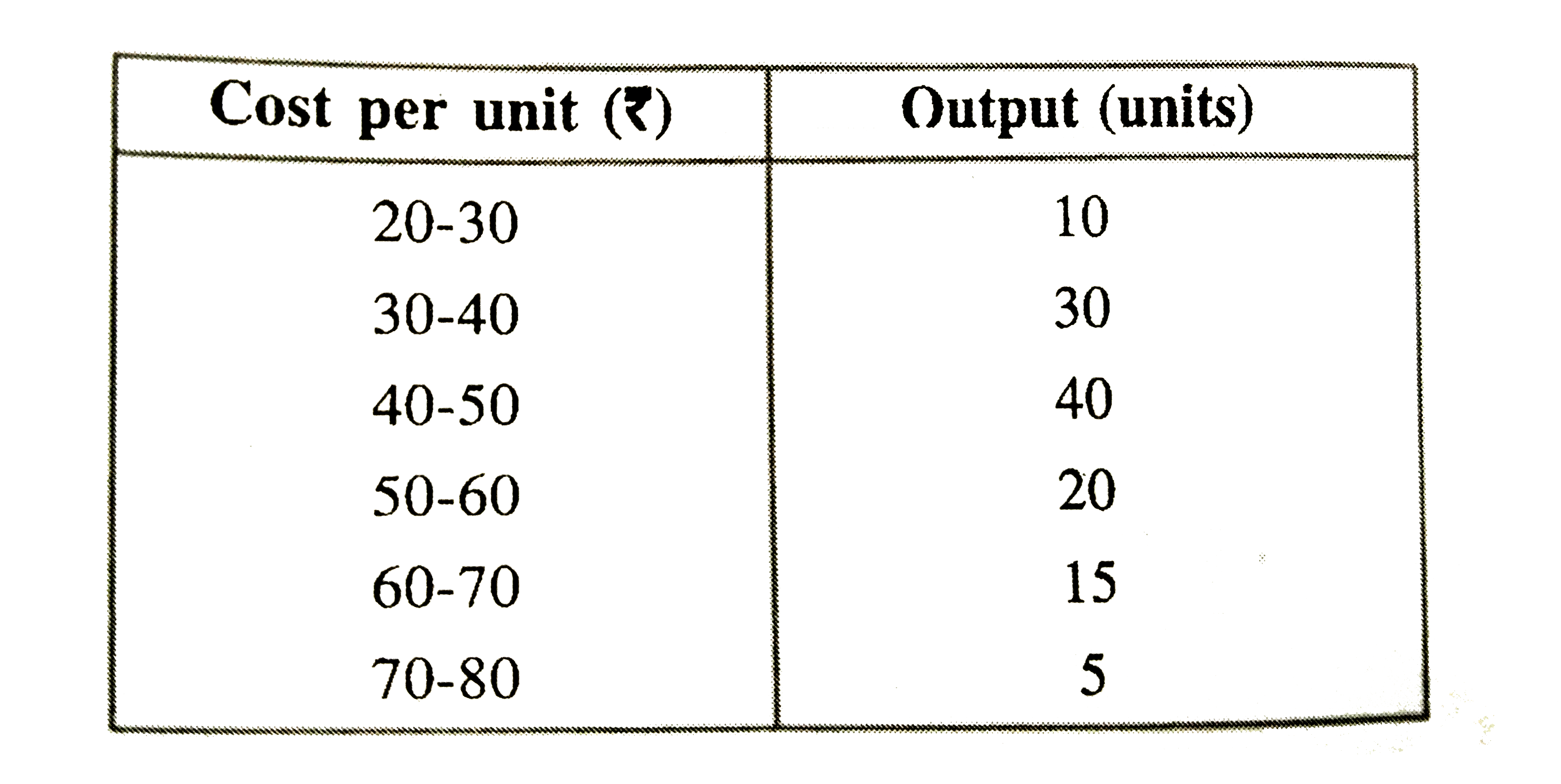IF the marginal cost is defined as the rate of change of total cost with respect to the number of units of the product, The marginal cost of producing x units of a product is given by marginal cost =2x√x+5. The cost of producing 4 units of the product is Rs 314.40 . Find the cost function.
The correct Answer is:C(x)=415
To find the cost function given the marginal cost, we will follow these steps:
Step 1: Understand the relationship between marginal cost and total cost
The marginal cost (MC) is defined as the derivative of the total cost (C) with respect to the number of units produced (x):
MC=dCdx
Given that the marginal cost is MC=2x√x+5.
Step 2: Set up the equation for total cost
We can express the relationship as:
dCdx=2x√x+5
Step 3: Integrate to find the total cost function
To find the total cost function C, we need to integrate the marginal cost:
C=∫2x√x+5dx
Step 4: Use substitution for integration
Let t=x+5. Then, dt=dx and x=t−5. When x=0, t=5.
Now, substituting into the integral:
C=∫2(t−5)√tdt
This can be simplified to:
C=∫2(t3/2−5√t)dt
Step 5: Integrate term by term
Now, we integrate each term separately:
C=2(25t5/2−5⋅23t3/2)+k
C=45t5/2−203t3/2+k
Step 6: Substitute back for t
Now substitute back t=x+5:
C=45(x+5)5/2−203(x+5)3/2+k
Step 7: Use the given condition to find k
We know that the cost of producing 4 units is Rs 314.40. So, we substitute x=4:
314.40=45(4+5)5/2−203(4+5)3/2+k
Calculating (4+5)5/2=95/2=243 and (4+5)3/2=93/2=27:
314.40=45⋅243−203⋅27+k
Calculating the terms:
45⋅243=194.4
203⋅27=180
So,
314.40=194.4−180+k
314.40=14.4+k
Thus,
k=314.40−14.4=300
Step 8: Write the final cost function
Now substituting k back into the cost function:
C=45(x+5)5/2−203(x+5)3/2+300
Final Answer
The cost function is:
C(x)=45(x+5)5/2−203(x+5)3/2+300
The marginal cost (MC) is defined as the derivative of the total cost (C) with respect to the number of units produced (x):
MC=dCdx
Given that the marginal cost is MC=2x√x+5.
We can express the relationship as:
dCdx=2x√x+5
To find the total cost function C, we need to integrate the marginal cost:
C=∫2x√x+5dx
Let t=x+5. Then, dt=dx and x=t−5. When x=0, t=5.
C=∫2(t−5)√tdt
This can be simplified to:
C=∫2(t3/2−5√t)dt
Now, we integrate each term separately:
C=2(25t5/2−5⋅23t3/2)+k
C=45t5/2−203t3/2+k
Now substitute back t=x+5:
C=45(x+5)5/2−203(x+5)3/2+k
We know that the cost of producing 4 units is Rs 314.40. So, we substitute x=4:
314.40=45(4+5)5/2−203(4+5)3/2+k
Calculating (4+5)5/2=95/2=243 and (4+5)3/2=93/2=27:
314.40=45⋅243−203⋅27+k
Calculating the terms:
45⋅243=194.4
203⋅27=180
So,
314.40=194.4−180+k
314.40=14.4+k
Thus,
k=314.40−14.4=300
Now substituting k back into the cost function:
C=45(x+5)5/2−203(x+5)3/2+300
The cost function is:
C(x)=45(x+5)5/2−203(x+5)3/2+300
Topper's Solved these Questions
- INTEGRALSBook:MODERN PUBLICATIONChapter:INTEGRALSExercise:SUB CHAPTER 7.3 EXERCISE 7(p) FAQ
Explore 23 Videos
- INTEGRALSBook:MODERN PUBLICATIONChapter:INTEGRALSExercise:SUB CHAPTER 7.3 EXERCISE 7(p) SHORT ANSWER QUESTION TYPE
Explore 11 Videos
- INTEGRALSBook:MODERN PUBLICATIONChapter:INTEGRALSExercise:SUB CHAPTER 7.3 EXERCISE 7(n) FAQ
Explore 10 Videos
- DIFFERENTIAL EQUATIONSBook:MODERN PUBLICATIONChapter:DIFFERENTIAL EQUATIONSExercise:CHAPTER TEST (9)
Explore 12 Videos
- INVERSE - TRIGONOMETRIC FUNCTIONSBook:MODERN PUBLICATIONChapter:INVERSE - TRIGONOMETRIC FUNCTIONSExercise:CHAPTER TEST (2)
Explore 11 Videos
Similar Questions
Knowledge Check
Marginal cost is defined as:
AThe change in total cost due to a one unit change in output.BTotal cost divided by output.CThe change in output due to a one unit change in an input.DTotal product divided by the quantity of input.When average cost of production falls, marginal cost of production must be :
ArisingBfallingCgreater than the average costDless than the average costIf marginal cost equals to average total cost,
Aaverage total cost is fallingBaverage total cost is risingCaverage total cost is maximizedDaverage total cost is minimized
Marginal cost changes at a rate faster than average cost.
View SolutionFrequency distribution of cost of production per unit of a good is given below. Find the average cost.

View SolutionTotal cost can be obtained as summation of marginal costs.
View SolutionWhen marginal costs are below average total costs,
View SolutionMarginal cost refers to addition to the total cost when one more unit of output is ______,
View Solution

